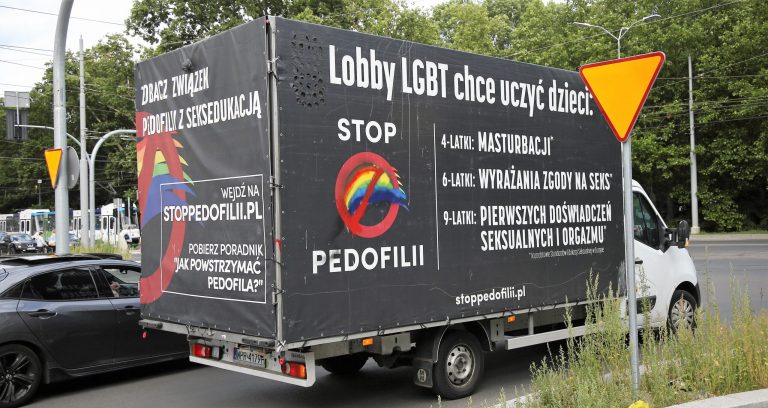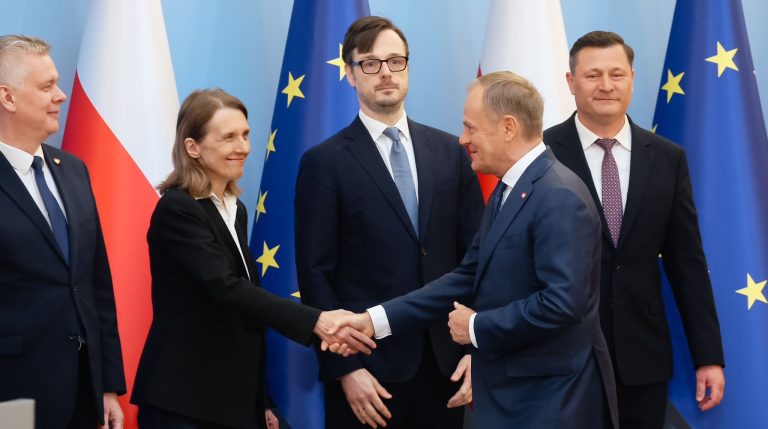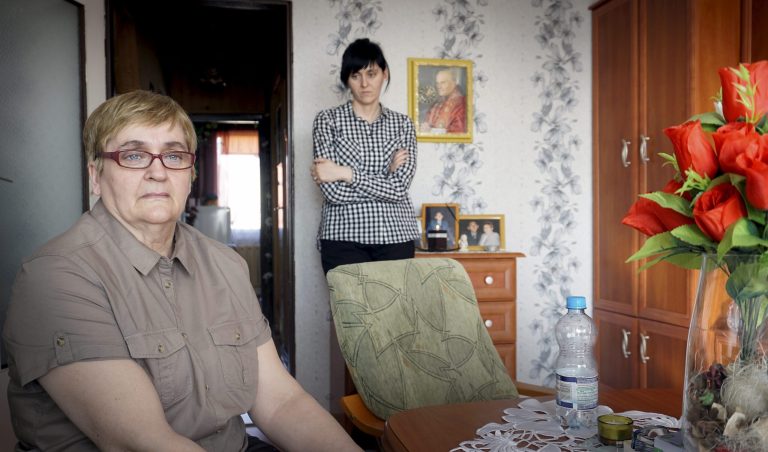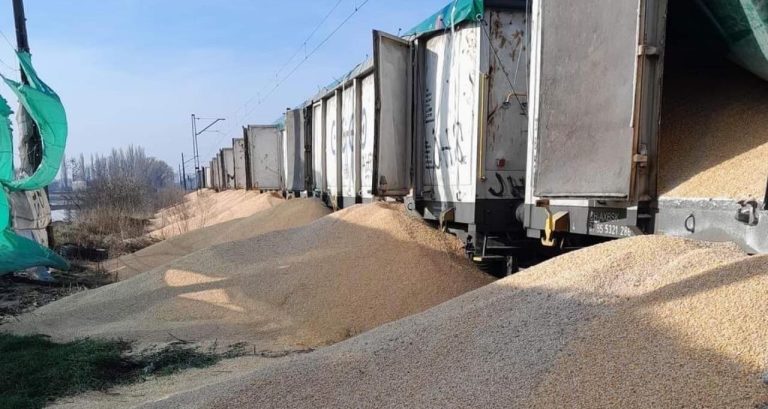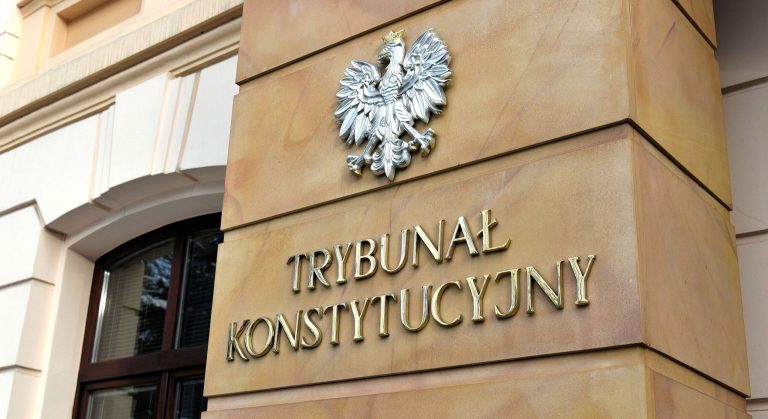“My colleagues say I’m too centrist”: an interview with Confederation’s candidate for Warsaw mayor
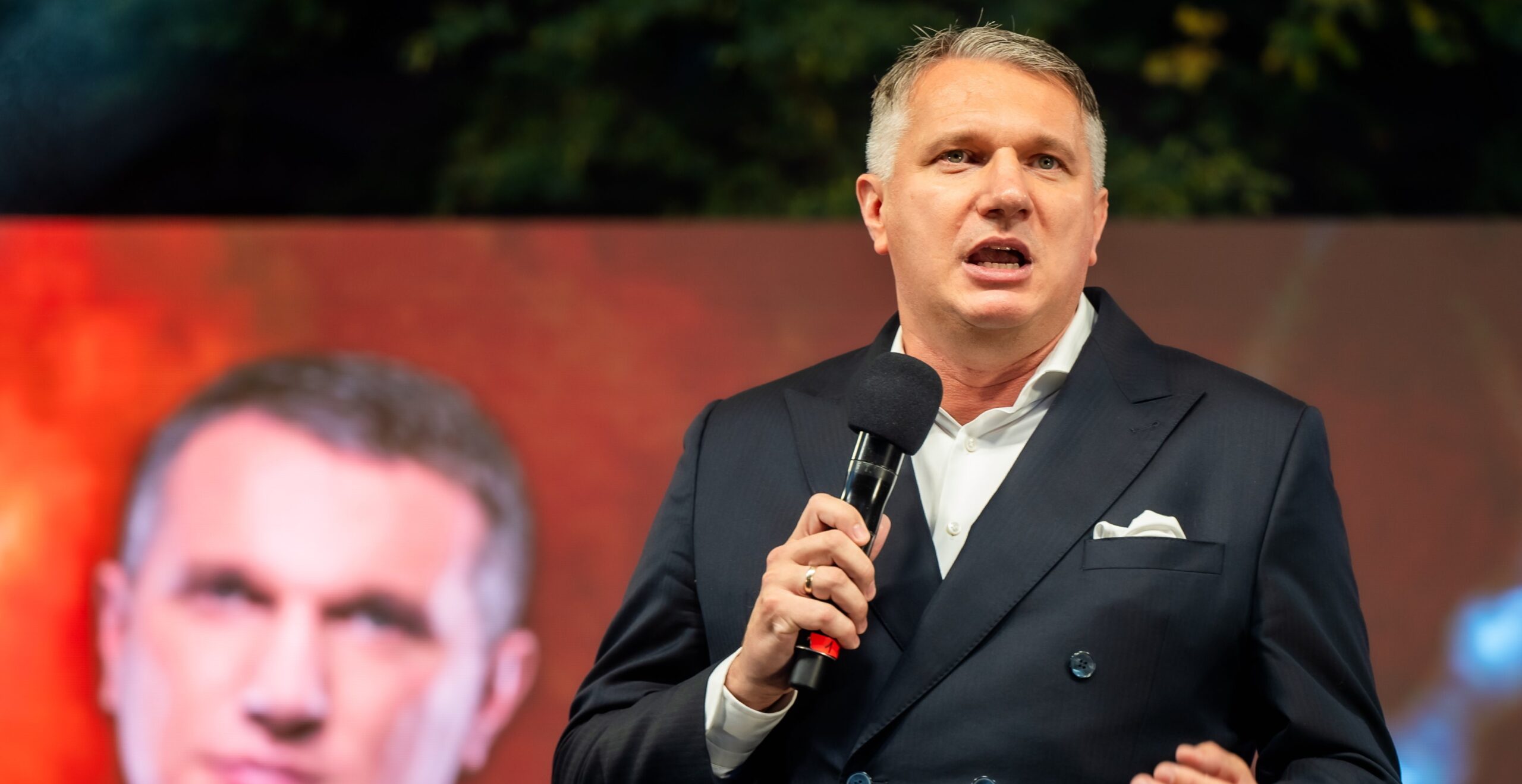
On 7 April, people around Poland will vote to choose mayors and local councils, in the first elections since last October’s parliamentary poll that saw the national-conservative Law and Justice (PiS) party lose power nationally and a new, more liberal government led by Donald Tusk come to office.
Notes from Poland has invited all four main candidates standing to be mayor of Warsaw to speak with us. In our first interview, we met with PiS candidate Tobiasz Bocheński. Below we present our conversation with Przemysław Wipler of the far-right Confederation (Konfederacja).
Seen as a relative moderate among many more radical colleagues, Wipler outlines a vision for solving Warsaw’s housing crisis, says he will “welcome” immigrants as long as they abide by the law, and pledges not to try to ban the city’s annual LGBT Equality Parade.
Alicja Ptak: Candidates from your group have previously run for mayor of Warsaw, but they have never achieved spectacular results. What would you like to achieve in these elections?
Przemysław Wipler: There has never been a candidate from my formation in the local elections because Confederation itself did not exist five years ago during the last local elections.
Various people [later associated with Confederation] have run in the past, indeed including me ten years ago. Anything we achieve now – with the present composition, with the present resources and with our own parliamentary caucus, with a presence in both private and public media – will be better.
When we stood separately, we didn’t get into parliament. Since we’ve become united, we got into parliament, and there was a period when we had a chance of a much better result [in the October parliamentary election].
In the end, we drew conclusions from this lesson in terms of personnel and due to various factors, among others, the farmers’ protests, we think we will have a good result this time around, especially at the level of the provincial assemblies.
Farmers have started fires outside Prime Minister @donaldtusk’s office amid outbreaks of disorder during their latest protest in Warsaw.
Some demonstrators clashed with police while others have thrown fireworks at officers https://t.co/G7DoEueetC
— Notes from Poland 🇵🇱 (@notesfrompoland) March 6, 2024
In addition, we are running in coalition with non-partisan local government officials including. With such veterans on our side, I am sure we will do well.
But Warsaw, where you are running, is the most liberal city in Poland. Also, there are probably not very many farmers here to support you.
That is why we are putting forth our most liberal candidate in Warsaw. [I am] a person who is criticised by some of our colleagues for being excessively centrist.
So what outcome are you hoping for now?
For a much better result than when I ran for office 10 years ago, when I had no parliamentary caucus, no political party behind me, no presence in the media.
Facebook has lifted the ban it imposed on far-right party Confederation last year for spreading Covid misinformation and hate speech.
The social media giant says the end of the pandemic and Poland’s upcoming elections are behind the decision https://t.co/Lel1XnRSCX
— Notes from Poland 🇵🇱 (@notesfrompoland) June 12, 2023
Several factors set this election apart from the one six months ago. One of them is that the Third Way [Trzecia Droga, a centre-right group in the current ruling coalition] has decided not to put forward any candidate [in Warsaw]. In the last election, we lost a huge number of voters to them, shaping how the government in Poland looks today.
So, I will naturally be courting Third Way voters for whom the candidacy of [the incumbent mayor] Rafał Trzaskowski [of the centrist Civic Platform] is neither natural nor obvious.
The second group of voters [whom I will be courting] may be even more numerous: PiS voters in Warsaw. They are completely unfamiliar with their mayoral candidate [Tobiasz Bocheński], whose ties to Warsaw are [limited to the fact] that for eight months, he was the provincial governor of Mazowieckie province [where Warsaw is located].
Over the years, I have been referred to – whatever I did – as a former PiS MP [Wipler served as a PiS MP from 2011-13]. And I am known among this electorate. I was elected as an MP from Warsaw from PiS [electoral] lists [in 2011].
Many [PiS] voters are not too enthusiastic about a candidate from Łódź with very loose ties to Warsaw. The last PiS candidate to win an election in Warsaw was a true Varsovian. I am talking about Professor Lech Kaczyński.
We spoke with @TABochenski, PiS’s candidate for Warsaw mayor in next month’s local elections.
He emphasised a focus on pragmatic, local issues rather than the „ideological quarrels” that he believes played a role in PiS losing power nationally last year https://t.co/w8LBDnqtda
— Notes from Poland 🇵🇱 (@notesfrompoland) March 15, 2024
I have very many such expressions of sympathy from PiS voters who say that they have no doubt that they will vote for me, even as they vote for councillors from PiS lists.
Warsaw is facing a worsening housing affordability crisis. According to a Politico ranking, Warsaw is the fourth-least affordable capital in Europe based on how long it takes to buy an apartment with an average salary. What would be your solution to this problem?
I would like to facilitate the transformation of the old shopping malls in Warsaw, which were built in the 1990s, into housing.
I think this was the idea put forward under the PiS government.
The law has been changed to allow this without passing a new [zoning] plan.
There are at least a dozen such shopping malls in Warsaw, the owners of which would close them tomorrow if they could start building residential houses there. These are large areas.
CEE capitals lead unaffordability ranking for home buyers. In Warsaw, you’d need to save an entire average salary for almost 20 years to buy a 75m2 flat. Rent isn’t cheap either.
Bad news for us, 30-somethings, looking to enter the property ladder.
Source: @POLITICOEurope pic.twitter.com/3BFPlSDq1s
— Alicja Ptak (@AlicjaPtak4) December 11, 2023
The fact that permits [for new construction] aren’t being issued now also means that there won’t be a supply of new housing for a few years and prices will keep on rising ever more rapidly.
But part of [this problem] actually comes down to regulatory issues and state policy. For me, a situation where large global funds buy up whole city quarters for short-term rentals and they don’t pay taxes in the city while using city infrastructure is simply a case of freeriding.
But another issue with the housing market is excessive tenant protection. People are afraid that if they rent to someone who doesn’t pay, they might not be able to get rid of such a person for years.
Does the mayor have any power to do something about it?
Has the [current] Warsaw mayor come to a minister responsible for construction and said, “Listen, we have to change this, because if we don’t, there’s a huge number of apartments that are standing empty”?
For eight years, his party was not in power [nationally], but they returned to power three months ago. Where are the proposals tabled by Trzaskowski?
So you are saying that, as mayor of Warsaw, you would be in a better position to negotiate with the government for it to take action at a national level?
I was a professional lobbyist. I would know how to lobby the government, on behalf of the people of Warsaw.
In Warsaw, there is yet another category of empty housing: communal apartments.
I will add something else, too. Warsaw provides economically disadvantaged people with housing that should never be made available to them. Housing that has no gas installation and is to be heated with electricity, resulting in bills that someone who qualifies for social assistance will never be able to pay.
Social tenants will never spend tens of thousands of zloty to buy a new gas heater. The city should get rid of such premises, which are often located in the city centre but need renovation. In return, the city could buy twice as many square metres in the suburbs in buildings that are insulated, with good infrastructure. I don’t understand why it hasn’t happened yet.
This process is currently totally ineffective. In my opinion, the social housing department [of the town hall] needs to be liquidated in its present form. I would give it an external entity to manage these properties, take stock, and achieve certain objectives, including economic ones.
After Kraków offered cheap rent in city-owned apartments to tenants who agree to renovate them, people queued overnight to apply.
Hundreds of applications were submitted on the first day of the programmehttps://t.co/pDHNlEAHqQ
— Notes from Poland 🇵🇱 (@notesfrompoland) March 4, 2024
Aren’t you concerned that in an attempt to maximise profit, social objectives will be overlooked by the managing company?
This is not about maximising profit, but about increasing accessibility and reducing costs for the city.
There should be also an electronic registry of all of the city’s properties with their status described. It would give citizens and journalists access to information on what is going on. So that [the mayor would be accountable to] the citizens of Warsaw, to the media, regarding why are there so many empty dwellings.
More and more immigrants are coming to Poland, and many of them choose Warsaw. Confederation has vocally opposed immigration.
We oppose social immigration and we oppose favouring immigrants over our own citizens. I am fiercely opposed to quotas for admission to, for example, nurseries and schools on the basis of nationality or refugee status.
There should be only one basic criterion to meet: having paid taxes in Warsaw for a certain period of time. Those who pay taxes in Warsaw should be rewarded and should have priority access to the city’s infrastructure.
Should immigrants and those wishing to settle and do business in Warsaw fear you as mayor of Warsaw?
For me, any person who wants to run a business here, work here legally, and pay taxes is warmly welcome. But I am appalled that thousands of people work in passenger transport – to put it simply, through the Uber and Bolt apps – who have not presented a clean criminal record or do not even have a driving licence certified in Poland.
And because of this, violence against women in Warsaw has increased significantly. And my wife, for example, is afraid for our daughters to use such transport. She is afraid to use such transport in the evening.
The number of foreigners in Poland’s social insurance system rose 6% in 2023 to reach 1.13 million. Immigrants now make up almost 7% of all those in the system
The largest increases were recorded by Belarusians, Ukrainians, Indians, Colombians and Nepalis https://t.co/eA1QVo0ydH
— Notes from Poland 🇵🇱 (@notesfrompoland) January 27, 2024
In 2019, Confederation activists announced that, if the group entered parliament, it would push for an “anti-LGBT” law that would, among other things, free “public space from all sorts of provocative symbols, provocative behaviour.” Would you, as mayor of Warsaw, ban the LGBT Equality March?
This is not the position of Confederation as a whole, much less of New Hope, the part of Confederation to which I belong.
We are in favour of protecting the right to freedom of assembly. The Equality March is one of the ways to manifest freedom of assembly, and if no law is broken during the march, then it should be legal.
An old video has emerged showing the campaign chief of the far-right Confederation pledging that his movement will create a register of gay people if it comes to power
The party is currently running third in the polls for October’s parliamentary elections https://t.co/ijufFJBjjh
— Notes from Poland 🇵🇱 (@notesfrompoland) September 1, 2023
Confederation opposes the proposed clean transport zone that would ban petrol cars older than 27 years, and diesel cars older than 17 years from the streets of Warsaw. You have said you will submit a complaint against this plan. Why?
I am by no means an opponent of ecological solutions aimed at improving air quality in order to protect health and life and make life more comfortable. However, the zone has been conceived in such a way that it restricts access to offices that are in the centre of Warsaw.
Almost all the important ministries and offices are in the city centre, and people from the provinces, who will not come here by public transport, because in many parts of Poland, as you are probably aware, there is simply no public transport. These people come often not in the newest cars. What are they going to do, leave their cars in the suburbs of Warsaw?
This policy excludes people from outside of Warsaw and access to central administration. It is also a blow to the one fifth of Warsaw’s residents who live in the zone [and whose cars do not meet the requirements imposed by it].
Also, the correlation with improvements in air quality as a result of this measure has not been proven, so the principle of proportionality has been breached. For example, traffic was very significantly reduced during the lockdowns, virtually to zero, and there was no significant change in air quality.
In addition, air quality has been improving independently in recent years, without any clean transport zone.
Warsaw will ban older cars from its city centre as part of a new „clean transport zone” to be introduced next year https://t.co/uFLPGv6iGV
— Notes from Poland 🇵🇱 (@notesfrompoland) January 26, 2023
Nevertheless, in winter, Warsaw still regularly ranks among the top ten cities in the world with the worst air quality. So if not a clean transport zone, what solutions do you have for improving air quality in Warsaw?
We must plant greenery in every space we can. Let’s be honest, in the centre of Warsaw, we have a gigantic number of surface car parks, because there is no underground parking infrastructure. Underground car parks will allow us to have greenery outside, and this greenery will clean the air.
Experts say that air pollution in Poland is mainly related to the method of heating, using coal-fired stoves, known as kopciuchy in Polish. How would Warsaw, under your mayorship, address this problem?
We are not in a position at the moment to take the risk to solve this problem at the level of Warsaw, because replacing kopciuchy with gas heaters in a situation in which gas heaters are about to start being discriminated against in the same way as kopciuchy could be a disaster. This is a consequence of EU policy, which is inconsistent, unreasonable and unsuited to Poles’ wallets.
What needs to be done is to improve energy efficiency and save electricity at the municipal building level.
What ideas do you have for the development of public transport in Warsaw?
I believe that one of the most important things is to complete the tram network. I believe the third line of the metro should not be built where it is planned now but rather run from Wilanów [in the south] to Białołęka [in the north].
I also believe that there should be no space for bus lanes along streets with trams because there should be only one preferred means of public transport, and to exclude two lanes, one for trams and the other for buses, is to increase congestion.
Warsaw has announced 56m zloty for “pre-design” work on a fourth metro line.
The mayor says improving public transport is an „absolute priority”. But his rival in next month’s elections says the mayor is digging up forgotten plans as part of the campaign https://t.co/lg3zkNeW2E
— Notes from Poland 🇵🇱 (@notesfrompoland) March 15, 2024
Confederation often portrays itself as a pro-business party. What are your ideas for Warsaw to attract more business, maybe from abroad?
Let me put it this way: it is not the city’s job to attract business from abroad. As a rule, apart from exceptional situations, if a business moves to Poland, it will choose Warsaw, because it is the best labour market and the most flexible in terms of finding top talent.
Besides, Poland is a centralised country, so the proximity of government offices is the reason why it is Warsaw, and not Kraków, Katowice, Wrocław, Poznań or Gdańsk, that international companies arriving in Poland move to.
But certainly, the city should manage municipal premises well, including those commercial properties that belong to Warsaw.
If you walk through the centre of Warsaw, you will see many empty premises, one next to the other. It is almost certain that you have found a communal tenement house managed by Rafał Trzaskowski’s officials. A private landlord would not allow the premises to stand empty for sometimes very many months.
Notes from Poland is run by a small editorial team and published by an independent, non-profit foundation that is funded through donations from our readers. We cannot do what we do without your support.
Main image credit: Maciej Wasilewski / Agencja Wyborcza.pl

Alicja Ptak is senior editor at Notes from Poland and a multimedia journalist. She previously worked for Reuters.

